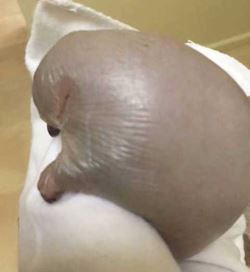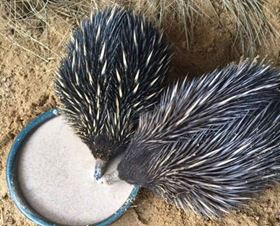'Golf Ball' turns out to be tiny orphaned puggle
Wednesday, April 13, 2016
This very young echidna puggle was just three weeks old when its mother was hit by a car, in October 2015. Kara was driving when she came across an echidna injured on the road; she stopped to help the injured animal.
Knowing that it was echidna breeding time and it is not possible to tell if an echidna is male or female, also not always possible to see the “pouch” on an echidna, Kara searched the surrounding area for a puggle. Her search was rewarded when she found what looked like a golf ball some distance away; it was a little unspined puggle weighing just 130 gram who had rolled out of its mothers “pouch” on impact.
The mother sadly did not survive the accident but the quick thinking actions taken by Kara ensured the young puggle was very quickly in care with an experienced WIRES volunteer. Our trained volunteer knew the young animal needed to be rehydrated quickly and what was required to make sure it thrived in care.

The young puggle was named 'Kara' while in care after her rescuer and she has now been in care for over five months and has a special friend, they do everything together including exploring the enclosure and lapping special echidna formula. There is still more time to go until release, which will most likely be some time in the next month or two.
Should you come across an injured Echidna please stop, check underneath the animal as well as the surrounding area, you may be able to save the life of one of our most iconic native animals, just as Kara was able to!

Recent Posts
WIRES launches its first wildlife rehabilitation centre - Mullyang
WIRES Emergency Response in the wake of ex-tropical cyclone Alfred
International Women’s Day Volunteer Spotlight: Shelley
Tropical Cyclone Alfred – Emergency Wildlife Advice
Interview with WIRES Training and Development
Celebrating Women in Science: The Journey of Holly, Wildlife Conservationist and WIRES Team Member
